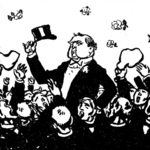De domesticatie van democratie in Nederland. Democratie als strijdbegrip van de negentiende eeuw tot 1945
DOI:
https://doi.org/10.18352/bmgn-lchr.8071Keywords:
Political Culture, Political PartiesAbstract
The Domestication of Democracy in the Netherlands: The Concept of Democracy as a Political Weapon from the Nineteenth Century until 1945
Democracy as we know it is a contested combination of majority rule (as opposed to elite rule) and the rule of law (as opposed to dictatorship). This contribution charts the historical debate about the concept of democracy in the Netherlands. Until the 1880s the word democracy was scarcely used in the Dutch parliament and, if used, usually in the derogatory sense of mob rule. Parliamentarians could ignore it because no large democratic reform movement existed until the neo-Calvinist Abraham Kuyper and Socialists began to advocate democracy as the rule of the common people. They used arguments that today would count as populist. In 1917-1919 general suffrage was introduced. In the interwar period liberals and social democrats used ‘democracy’ to defend the values of parliamentary democracy against National Socialism. After the war a new consensus emerged – democracy was first and foremost the absence of dictatorship. Democracy was stripped of its populist side, it was ‘domesticated’. Today it has become clear that this domestication remains contested.
Downloads

Downloads
Published
Issue
Section
License
Authors who publish with this journal agree to the following terms:
a) Authors retain copyright and grant the journal right of first publication with the work simultaneously licensed under a Creative Commons Attribution 4.0 International (CC BY 4.0) that allows others to share the work with an acknowledgement of the work's authorship and initial publication in this journal.
b) Authors are able to enter into separate, additional contractual arrangements for the non-exclusive distribution of the journal's published version of the work (e.g., post it to an institutional repository or publish it in a book), with an acknowledgement of its initial publication in this journal.
c) Authors are permitted to post their work online (e.g., in institutional repositories or on their website) prior to and during the submission process.
Authors are explicitly encouraged to deposit their published article in their institutional repository.











